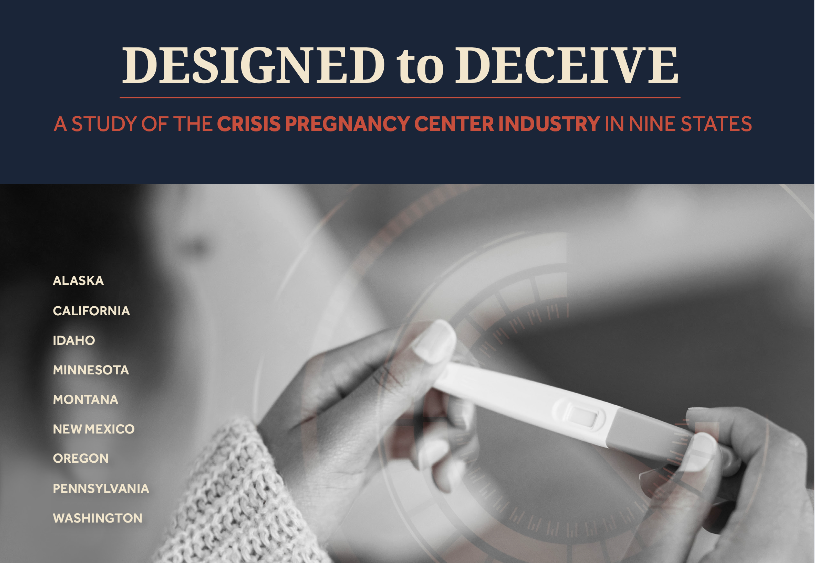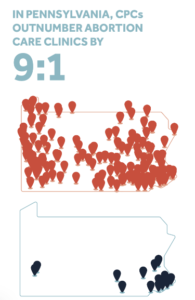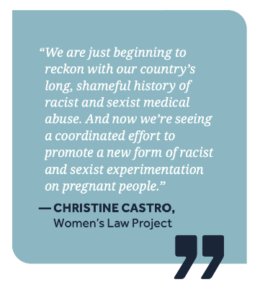
In October 2021, Women’s Law Project published Designed to Deceive: A Study of the Crisis Pregnancy Industry in Nine States in collaboration with The Alliance: State Advocates for Women’s Rights and Gender Equality and California Women’s Law Center.

Designed to Deceive is a study of the modern crisis pregnancy center (CPC) industry. Over the last 20 years, CPCs have expanded in number and power while serving as the anti-abortion movement’s strategic conduit to siphoning increasing amounts of government funds.
Investment of public money in CPCs is escalating, especially in the states with virtually no government oversight, accountability, or transparency.
While CPCs historically opened near reproductive health clinics and mimicked their names and signage, contemporary CPCs often claim to be medical clinics themselves, despite their clear ideological mission. Medical experts publishing in the AMA Journal of Ethics call CPCs “legal but unethical” because despite “giv[ing] the impression that they are clinical centers, offering legitimate medical services and advice,” CPCs are generally not subject to regulatory oversight that applies to health care facilities.
CPCs’ primary strategy and mission is still intercepting low-income pregnant people searching for abortion care to prevent them from accessing abortion and contraception. Contemporary CPCs, however, are increasingly plugged into the global anti-abortion movement’s sophisticated digital infrastructure via an affiliation model that facilitates expansion, client surveillance, and systemic, coordinated promotion of anti-abortion disinformation. Though they may appear to be independent neighborhood facilities, almost half of all CPCs surveyed are storefronts affiliated with at least one major national or international anti-abortion organization.
 While severe legislative restrictions often make headlines, the modernized, proliferating, and mostly evangelical CPC industry’s critical role in the anti-abortion, anti-LGBTQ+ movement is relatively obscured from public view. The effect of this seismic shift in the landscape of reproductive healthcare remains unknown.
While severe legislative restrictions often make headlines, the modernized, proliferating, and mostly evangelical CPC industry’s critical role in the anti-abortion, anti-LGBTQ+ movement is relatively obscured from public view. The effect of this seismic shift in the landscape of reproductive healthcare remains unknown.
Today, CPCs in at least 29 states obtain state funding. Investigations into publicly-funded CPCs by advocates and watchdog groups have found evidence of misuse, waste, and potential skimming of funds in multiple states, including Florida, Michigan, Minnesota, North Carolina, Texas, and here in Pennsylvania.
Yet CPCs continue to secure state contracts while the nature and quality of their services remains largely unexamined and unregulated by policymakers.
Approximately 156 crisis pregnancy centers are operating in Pennsylvania. Of those, 27 of the state’s 156 (17.3%) crisis pregnancy centers are publicly funded by the state via Real Alternatives, an organization plagued by allegations of misuse of public funds, waste, and lack of transparency.
CPCs now outnumber abortion clinics by an average of 3:1. In Pennsylvania, the ratio is 9:1.
 In addition to millions of dollars funneled to Real Alternatives through a state contract, Pennsylvania is one of a handful of states that double-funds CPCs by diverting Temporary Assistance for Needy Families (TANF), safety-net funds earmarked for pregnant people and children in poverty.
In addition to millions of dollars funneled to Real Alternatives through a state contract, Pennsylvania is one of a handful of states that double-funds CPCs by diverting Temporary Assistance for Needy Families (TANF), safety-net funds earmarked for pregnant people and children in poverty.
In 2017, a Pennsylvania official denounced Real Alternatives for “skimming” public funds. In July 2020, a watchdog group called Campaign for Accountability filed a 27-page public complaint alleging widespread misuse of public funds, waste, and lack of transparency by Real Alternatives. In 2019, Real Alternatives was defunded in Michigan in the wake of a similar public complaint.
Pennsylvania refunded Real Alternatives in FY 2020–2021.
Designed to Deceive launches October 26.

